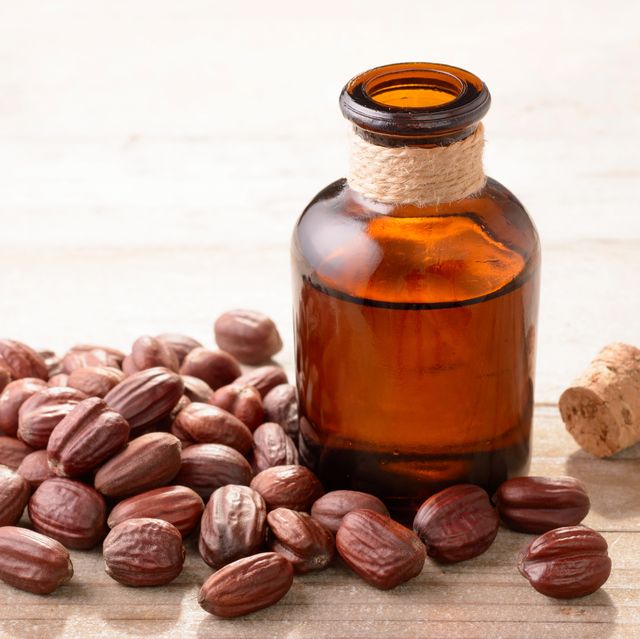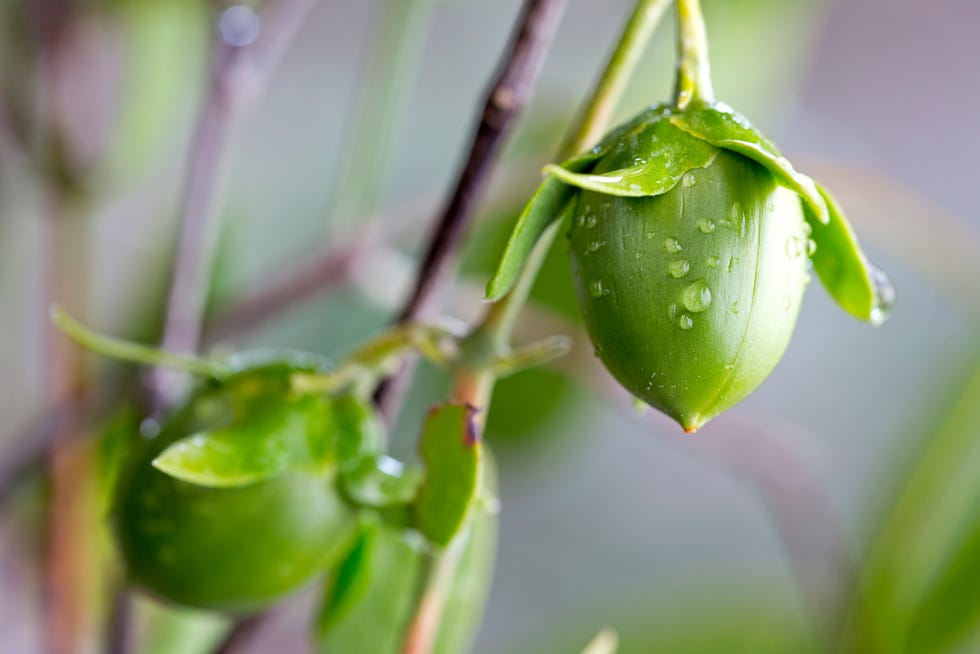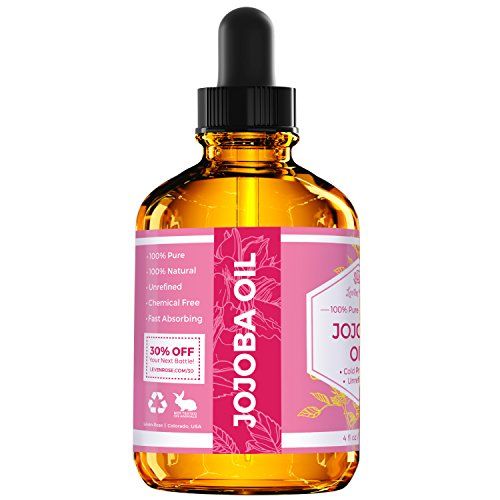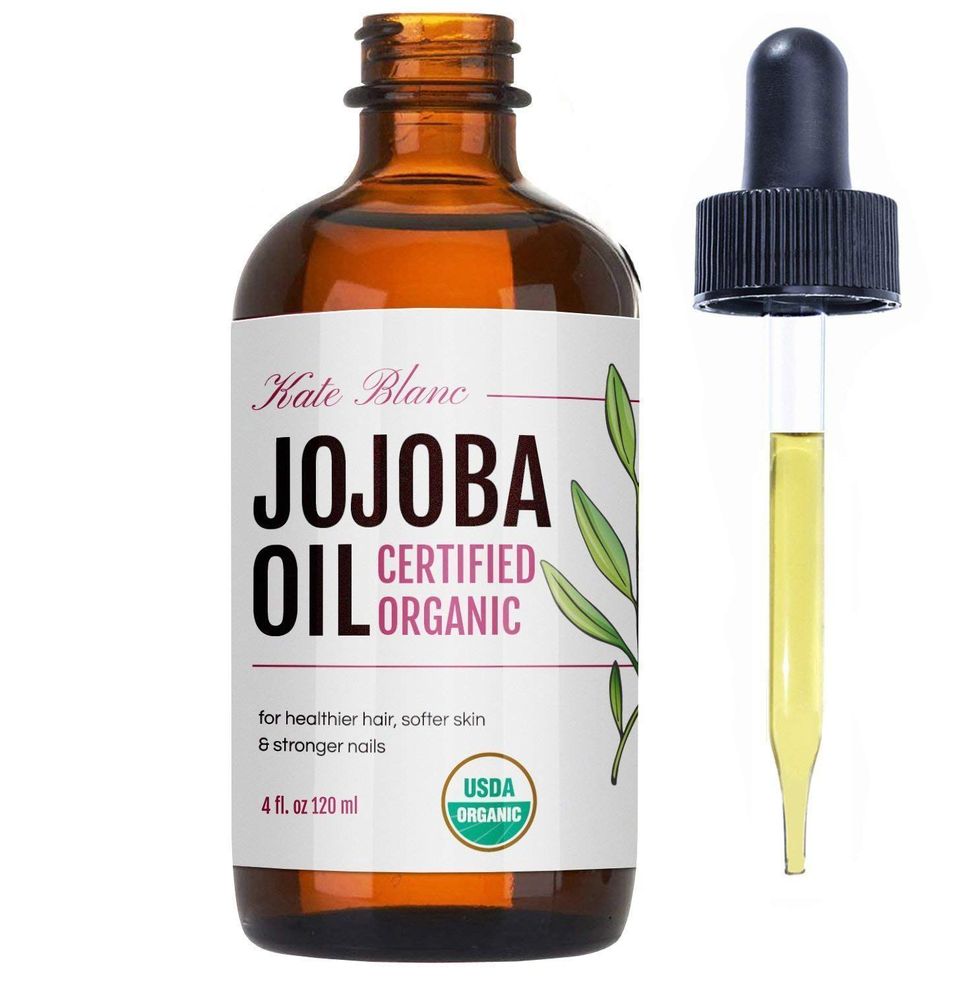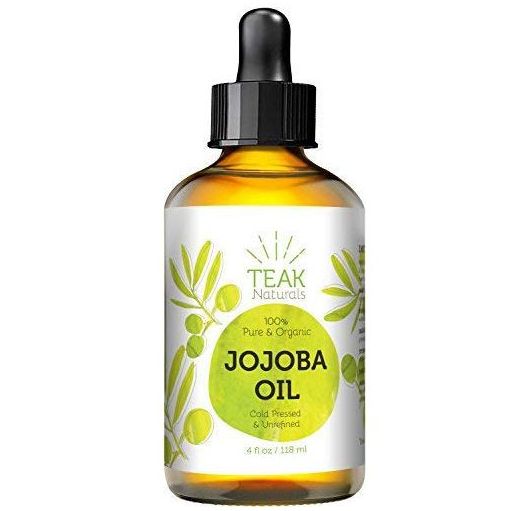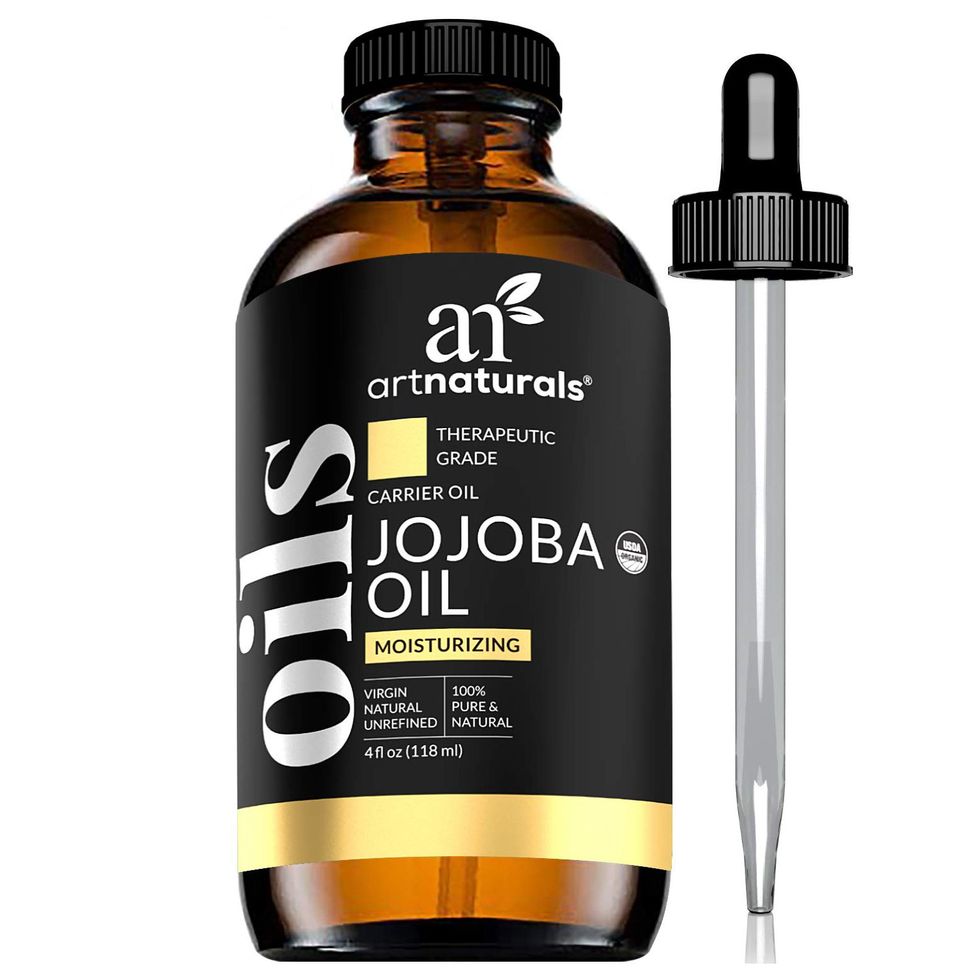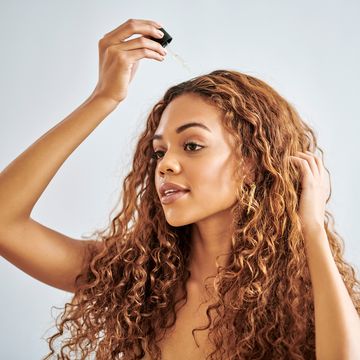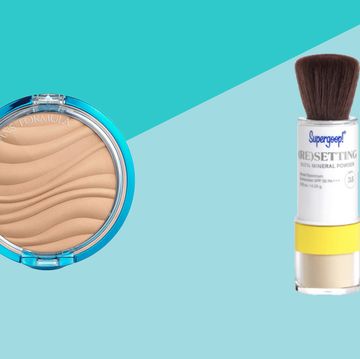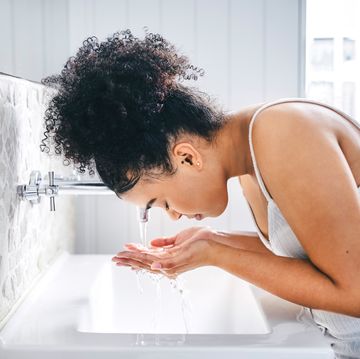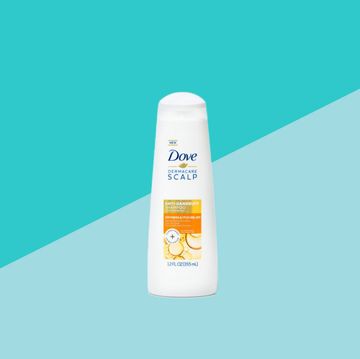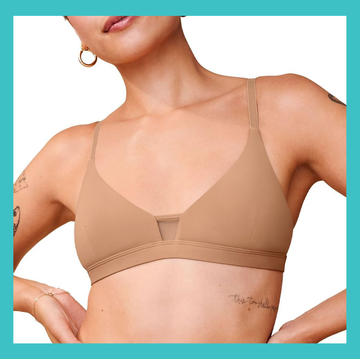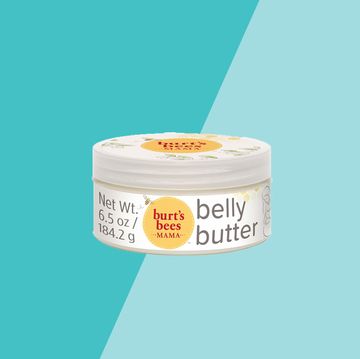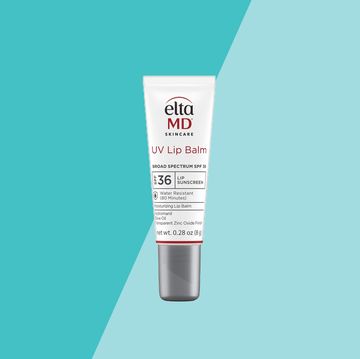Few beauty products are as straightforward as an oil: Slather a drop or two onto your problem areas—whether it be that dry patch on your skin or on the split ends of your hair—and get back to your regularly scheduled programming. But choosing one out of the dozens of oils out there to add to your routine? Not so easy to figure out.
There’s coconut, rosehip, argan, and grapeseed oil, to name a handful—all of which contain unique properties that can benefit your skin and hair in impressive ways. But another oil that deserves a humble brag? Jojoba oil (and not just because its name is fun to say).
Here’s why dermatologists believe this uber-versatile skincare oil deserves a spot in your medicine cabinet.
What is jojoba oil, exactly?
Jojoba oil is derived from the seeds of the jojoba shrub, a perennial native to the North American deserts. The oil accounts for 50% of the jojoba seed and is extracted by cold-pressing, a process that helps maintain the rich nutritional value of the oil.
Similar to other skincare oils, jojoba oil contains oodles of vitamins, antioxidants, and anti-inflammatory properties, but what sets it apart from the others is that it’s technically not an oil, but a wax ester.
What does this mean for your skin? “Jojoba oil has a similar molecular structure and composition to sebum, which the skin naturally produces for moisturization,” says Zain Husain, M.D., a board-certified dermatologist practicing at the New Jersey Dermatology & Aesthetics Center.
Translation: When you slather it on your face, jojoba oil mimics the skin’s sebum and balances out your complexion, adding more sebum where it’s needed, and winding down production where it’s not. As for your hair? Sebum also naturally coats your strands, so applying jojoba where you need it the most can make your hair feel soft and even boost shine.
Its chemical composition also makes it one of the more stable oils around. While other oils tend to go rancid lightning-fast, jojoba oil typically has a much longer shelf life.
How to choose the best jojoba oil for your skin and hair
When shopping around for jojoba oil, make sure it’s 100% pure—organic, cold-pressed, unrefined—because processed oil that contains preservatives and other ingredients may irritate the skin and cause adverse side effects, such as eczema or allergic reactions.
It’s also important to take a peek at the ingredients list to ensure that jojoba is listed as the main ingredient, as opposed to a supplemental product added in. “Jojoba as the main ingredient means you’re getting an adequate amount of the product so it can fulfill your desired skin and hair needs,” says Dr. Husain.
Still not sure if the jojoba oil you’ve purchased is top-notch? “Pure jojoba oil usually possesses a straw-like color that can range from yellow to gold,” says Joel Schlessinger, M.D., Omaha-based board-certified dermatologist and RealSelf.com contributor. One of its best characteristics is its ability to absorb fast, so “if a jojoba oil feels like it’s just sitting on top of the skin, it’s likely lower quality,” he adds.
Improve the skin barrier
Jojoba oil is loaded with antioxidants, such as vitamins A and E, and omega-6 fatty acids, which are essential components of the skin’s barrier. It also acts as a humectant, meaning it works to retain moisture in the skin. This protective layer, combined with the anti-inflammatory effects of the vitamin E, gives skin the breather necessary to focus on the healing process.
“This can be especially beneficial to those with eczema and psoriasis,” says Dr. Husain. Applying a drop or two of jojoba oil to these trouble spots, once to twice daily, should help turn things around.
Soothe dry skin
Similar to other oils, jojoba oil is great for soothing dry, irritated skin (or preventing it from cropping up in the first place). “Its anti-inflammatory benefits help calm the complexion, while providing the hydration it needs to restore itself,” says Dr. Schlessinger. And because it’s a humectant, it forms a protective seal over the skin to prevent future moisture loss.
Use a few drops of jojoba oil straight-up after cleansing, or mix it into your go-to moisturizer to amp up its effectiveness and super-hydrate your skin.
Treat acne
“Jojoba oil’s chemical composition allows it to mimic the skin’s sebum, therefore it balances out the skin by not overproducing oil in areas of the skin where it’s not needed,” says Michele Green, M.D., a New York City-based board-certified dermatologist and RealSelf.com contributor. It also contains antimicrobial properties that can ward off certain types of bacteria, making it an excellent choice for acne-prone skin.
You can either swipe a few drops over your face with a cotton round—after cleansing and toner, but before any heavier creams and lotions—or use it as a carrier oil for other acne-fighters, such as tea tree oil.
Delay signs of aging
Jojoba oil is naturally rich in vitamin E, a potent antioxidant that helps the skin defend itself against free radicals that can cause premature aging and skin damage, says Dr. Schlessinger. It’s also rich in amino acids, which are the building blocks of collagen. The result? A reduction in the appearance of fine lines and wrinkles, and improvements in skin texture, tone, and elasticity.
To score these anti-aging perks, you can apply a few drops of jojoba oil to freshly cleansed skin, or you can use it to boost the efficacy of your go-to anti-aging products.
“It’s super-lightweight, making it the perfect carrier oil for treatment products and actives which are otherwise unable to penetrate the deep layers of the skin,” says Dr. Green.
Fight cold sores
“There are several essential oils, such as tea tree and peppermint, which are known to help lessen the severity of a cold sore, even help ward one off,” says Debra Jaliman, M.D., New York City-based board-certified dermatologist and author of Skin Rules. But these oils need to be diluted by a carrier oil so they don’t irritate the skin, and that’s where jojoba oil comes in.
Jojoba oil happens to contain docosanol (the active ingredient in OTC cold sore creams), which does its thing by inhibiting the virus from getting to healthy skin cells—and may be the one-two punch needed to show your cold sore who’s boss. Simply dab the diluted tea tree (or peppermint) oil onto your cold sore with a clean cotton swab, and mosey on with your day.
Remove makeup
Jojoba oil makes for a great makeup remover, as it’s lightweight and non-greasy, says Dr. Green. Plus, it gets all of your makeup off without tugging at the skin.
Massage a few drops onto your face, and let it sit for about a minute. Wet a soft washcloth with warm water and gently wipe your makeup off, leaving your eye makeup until last so the oil has more time to do its thing. Lightly pat your skin dry, then continue on with your skincare routine.
Condition hair
Remember, jojoba oil molecules are similar to sebum, which naturally coats your hair with oil. “Applying it to your scalp and hair can hydrate individual hair strands and help lock in moisture, leaving your hair feeling soft and healthy,” says Dr. Husain. And because it’s super-lightweight, people with thin or fine hair can use it to hydrate their strands sans the heaviness of regular conditioners.
You can add a few drops of jojoba oil to your go-to conditioner, apply the oil directly to strands post-shampoo and pre-styling—and if your hair’s Sahara-dry, you can also slather it on for a few hours (or overnight) for a deep-conditioning effect.
Ditch dandruff
Jojoba oil naturally contains palmitic acid and stearic acid, both of which are known for conditioning and protecting the hair, says Dr. Green. When massaged onto the scalp, the added hydration can help prevent dandruff or an itchy scalp—and because jojoba oil is skilled at balancing out the skin, ongoing use may also keep those pesky flakes from returning.
Depending on the severity of your dandruff, you could use jojoba oil as a pre-treatment before shampooing (say, letting it sit for 20 minutes before rinsing), or as a leave-in scalp conditioner post-shampoo, suggests Dr. Green.
Protect against damage
The fatty acids in jojoba oil not only condition the hair, but protect it from styling tool-induced heat damage, says Dr. Jaliman. And remember those potent antioxidants? They defend your hair against free radicals the same way they do your skin. For those with color-treated hair, adding jojoba oil to your repertoire can help extend the length of your color too, says Dr. Jaliman. To score these protective benefits, run a drop of two of jojoba oil through your hair before and after styling.
Promote hair thickness and growth
The vitamins and minerals found in jojoba oil (vitamins B and C, zinc, copper) provide nourishment to the hair and help keep it thick and growing. “The zinc that’s found in jojoba oil, for example, is vital for the tissue in the hair to grow,” says Dr. Husain. “It helps the follicles grow and maintains the functionality of the surrounding oil glands.”
It’s also excellent for strengthening the hair, he adds, and advises that anyone suffering from hair loss apply a few drops to their scalp as a regular leave-in treatment. “This will help moisturize the follicles to prevent dryness, which can lead to hair falling out,” says Dr. Husain.
Delay grays
Copper deficiency can lead to loss of pigment and premature gray hair, and copper itself is currently being studied as a potential topical anti-aging compound. Because jojoba oil contains copper, along with protective antioxidants like vitamins C and E, applying it could help slow down this process and restore some of the lost copper, says Dr. Husain.
Until the jury’s back on how effective jojoba oil is in this department, give it as much time to (potentially) combat grays as possible by using it as a leave-in conditioner. Massage a few drops onto your scalp and hair, after showering and before styling—then cross your fingers.
Like what you just read? You’ll love our magazine! Go here to subscribe. Don’t miss a thing by downloading Apple News here and following Prevention. Oh, and we’re on Instagram too.
Krissy is a regular contributor to Prevention, and she also writes for Cosmopolitan, Weight Watchers, Women's Health, FitnessMagazine.com, Self.com, and Shape.com.
